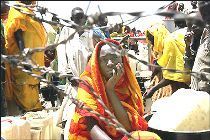Mediator: Deadlock in 2-week-old talks on Sudan’s Darfur crisis
By GILBERT DA COSTA and GEORGE OSODI
ABUJA, Nigeria, Sep 6, 2004 (AP) — Peace talks on Sudan’s violence-torn Darfur region are deadlocked, one mediator said Monday, as the African Union’s chief appealed to the Sudanese government and rebels to compromise.
 The two-week-old talks in Nigeria’s capital Abuja have failed to move past the crucial question of disarming – with rebels saying they will lay down their guns only after Sudan’s pro-government militia, the Janjaweed, does so.
The two-week-old talks in Nigeria’s capital Abuja have failed to move past the crucial question of disarming – with rebels saying they will lay down their guns only after Sudan’s pro-government militia, the Janjaweed, does so.
“It appears deadlocked, as the two sides are holding to their hard-line positions,” Brig. Gen. Festus Okwonko, a mediator and commander of the African Union’s cease-fire monitoring troops in Darfur, told reporters.
Negotiations are aimed at ending a 19-month-conflict in Sudan’s western region of Darfur that has killed tens of thousands and driven an estimated 1.2 million civilians from their homes. The Janjaweed are accused of carrying out atrocities in attacks on non-Arab African villages. The United Nations calls it the world’s worst humanitarian crisis.
The two rebel movements – the Sudanese Liberation Army and the Justice, Equity Movement – draw their support from African tribes in the region. The Sudanese government is acccused of backing the Janjaweed in an effort to stamp out the rebellion, a charge Khartoum denies.
Sudan’s government and the rebels laid out sharply conflicting positions in responses to a mediator’s draft proposal on security.
Mediators asked Nigerian President Olusegun Obasanjo, the African Union’s current chief, to intervene personally.
Obasanjo did so Monday, urging both rebels and Sudan’s government to ease their demands at the scheduled resumption of talks later in the day, said Ahmed Tugod, spokesman for the rebels.
The rebels remain insistent that government warplanes stop bombing in Darfur and that Janjaweed militia be disbanded and investigated for any human-rights violations, Togod said.
“For us, these issues will decide the fate of the talks,” the rebel spokesman said.
Sudan’s chief negotiator, Majzoub Khalifa, insisted Monday his government remained committed to the talks, saying: “We are ready to continue the negotiations on the security matter.”
Sudan’s delegates, however, warned against any intervention in the talks beyond that of the African Union – apparently fearing the United States or others might be moved to bring pressure to bear.
“Any … type of interventions in the talks will only complicate matters,” said Gen. Abdullah Saffi El Nour, a Sudan government envoy to the talks.
Current talks are the second attempt since Darfur’s conflict broke out. The latest negotiations have made virtually no clear advances since opening Aug. 23.
A draft protocol on humanitarian issues prepared by mediators on Thursday failed to win signatures of either side, after rebels stuck to immediate disarming of the Janjaweed as a precondition.
The humanitarian agreement would have paved the way for massive international relief efforts for civilians uprooted or injured by the conflict.
The Darfur violence erupted in February 2003 when the two rebel groups rose up against the Arab-dominated government in Khartoum. The conflict grew out of years of mounting trouble between non-Arab farmers and Arab herdsmen, competing for scarce water and resources in the vast, arid region.
A 30-day ultimatum issued to Khartoum on July 30 by the U.N. Security Council to improve humanitarian access and rein in the Janjaweed expired early last week.
In a report issued Sept, 1, U.N. Secretary-General Kofi Annan told the Security Council that the Sudanese government had not done enough to provide security for the 1.2 million “terrorized and traumatized” people displaced by the violence, opening up prospects for U.N.-backed sanctions against Khartoum.
